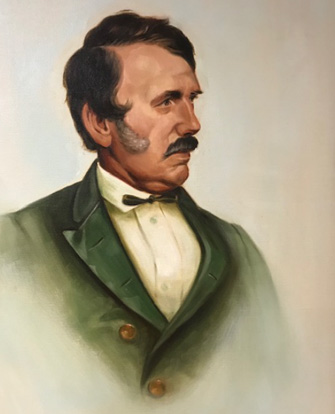David Livingstone
1813 – 1873
 Born the son of deeply religious but humble parents, who lived near Glasgow, Scotland. He studied medicine and theology at the University of Glasgow. Livingstone tried to go to China as a missionary in 1838, but when the Opium War in China closed the doors, he went instead to South Africa. He had been challenged by Robert Moffat, a missionary to that country, who said, “On a clear morning the smoke of a thousand villages could be seen, where the name of Christ had never been heard.” Livingstone joined Moffat and married his daughter.
Born the son of deeply religious but humble parents, who lived near Glasgow, Scotland. He studied medicine and theology at the University of Glasgow. Livingstone tried to go to China as a missionary in 1838, but when the Opium War in China closed the doors, he went instead to South Africa. He had been challenged by Robert Moffat, a missionary to that country, who said, “On a clear morning the smoke of a thousand villages could be seen, where the name of Christ had never been heard.” Livingstone joined Moffat and married his daughter.
Livingstone pushed two hundred miles north of Moffat’s assigned station and founded another mission station, Mabosta. Livingstone continued on the mission field and advanced fourteen hundred miles into the interior in spite of the hardships. His purpose was to open the door of Africa to the Gospel. He was attacked and maimed by a lion, his home was destroyed during the Boer War, his body was often racked by fever and dysentery, and his wife died on the field. One morning in May, 1873, a faithful native found Livingstone by his bed, kneeling and dead. The natives buried his heart in Africa as he had requested, but his body was returned to England and buried in Westminster Abbey.
Many felt that no single African explorer had done so much for African geography as Livingstone did during his thirty years work. His travels covered one-third of the continent, from the Cape to near the Equator, and from the Atlantic to the Indian Ocean. Livingstone was no hurried traveler; he did his journeying leisurely, carefully observing and recording with the eye of a trained scientific observer. His example and his death acted as an inspiration, filling Africa with an army of explorers and missionaries, and raising in Europe so powerful a feeling against the slave trade that through him slavery may be considered as having received its death blow.
Henry M. Stanley, a newspaper correspondent sent by The New York Herald, set out to find Livingstone after he had not been heard from for a long period of time. Stanley was so impressed with Livingstone that, after his death, Stanley carried on mission work, leading the king of Buganda to Christ.
 https://www.tbcasheville.org/wp-content/uploads/2024/12/Merry-Christmas-Pastor-Wide.png
1856
3300
Andrew W
https://www.tbcasheville.org/wp-content/uploads/2022/09/TBCStackLogo-White.svg
Andrew W2024-12-19 10:57:572024-12-19 16:56:15Merry Christmas 2024
https://www.tbcasheville.org/wp-content/uploads/2024/12/Merry-Christmas-Pastor-Wide.png
1856
3300
Andrew W
https://www.tbcasheville.org/wp-content/uploads/2022/09/TBCStackLogo-White.svg
Andrew W2024-12-19 10:57:572024-12-19 16:56:15Merry Christmas 2024


 Born the son of deeply religious but humble parents, who lived near Glasgow, Scotland. He studied medicine and theology at the University of Glasgow. Livingstone tried to go to China as a missionary in 1838, but when the Opium War in China closed the doors, he went instead to South Africa. He had been challenged by Robert Moffat, a missionary to that country, who said, “On a clear morning the smoke of a thousand villages could be seen, where the name of Christ had never been heard.” Livingstone joined Moffat and married his daughter.
Born the son of deeply religious but humble parents, who lived near Glasgow, Scotland. He studied medicine and theology at the University of Glasgow. Livingstone tried to go to China as a missionary in 1838, but when the Opium War in China closed the doors, he went instead to South Africa. He had been challenged by Robert Moffat, a missionary to that country, who said, “On a clear morning the smoke of a thousand villages could be seen, where the name of Christ had never been heard.” Livingstone joined Moffat and married his daughter.





